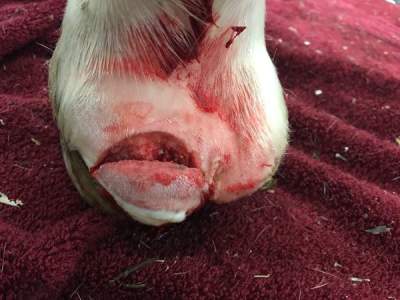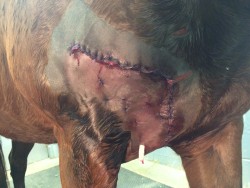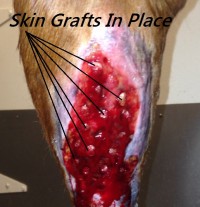 When your horse has sustained a wound, it’s important that it heals properly. In doing so, it will prevent complications. If your horse is wounded, contact your veterinarian for treatment and advice. Here are eleven reasons why a horse’s wound wouldn’t heal.
When your horse has sustained a wound, it’s important that it heals properly. In doing so, it will prevent complications. If your horse is wounded, contact your veterinarian for treatment and advice. Here are eleven reasons why a horse’s wound wouldn’t heal.
Warning: the following contains graphic photos.
Infection
If the wound is infected, it will not heal. Cleaning and keeping a wound clean is the best prevention against infection setting in and will promote healing.
Foreign Objects
If the wound contains a foreign body, healing will be delayed as the body tries to force the object out. Foreign objects could be anything from a small piece of dirt or gravel to a bit wire or wood. A contaminated foreign body may infect the wound, resulting in complications.
Tissue Loss
Large wounds may lack the tissue required to close up and heal on their own. If left without stiches, the wound may never close up. To promote healing, advanced bandaging has been developed. The bandaging acts like a sling across the wound to support healing, as well as supplies the wound with the building blocks for repair like:
- Collagen
- Amnion
- Intestines from other animals
Skin grafting is another technique used to repair wounds where the tissue is lost to damage.
High Movement Area
Damage located in high movement areas like the hock and pastern joint impede wound healing. Casting a wound to reduce movement of the area can be a viable option and promote effective healing.
Necrotic Tissue
Necrotic tissue is tissue that has died and thus cannot repair itself. In smaller wounds, a good flushing and cleaning will remove the dead tissue. In larger wounds, your veterinarian will cut away any dead or dying tissue.
 Lack of Blood & Oxygen
Lack of Blood & Oxygen
Blood and oxygen are needed for healing, as they deliver fresh nutrients and oxygen into the wound. If the wound is not being provided with blood or oxygen, it will not heal.
Repeated Aggravation
Repeated aggravation wounds are caused by repetitive actions like tack rubbing a horse raw, a horse that clips another limb as it move, or a horse constantly rubbing or chewing on itself. The only way these wounds will heal is to remove the repetitive action.
Extreme Environments
Wounds have a harder time healing in very cold, hot, wet or dry conditions. Your veterinarian will come up with a treatment plan to maximize healing potential and recommend the best healing environment for your horse.
Poor Health
A horse whose health is already comprised by immune deficient disease like Cushing’s or lymphoma, or horses that are on steroids can face a more difficult wound healing process. If your horse has sustained a wound and is in poor health, your veterinarian will recommend a treatment plan.
User Error
Learning what to do and what not to do when your horse has a wound can affect the overall outcome. It is possible for a well-meaning horse owner to do more harm than good when trying to take care of a wound by themselves. It is recommended that you contact your veterinarian for advice if your horse is wounded.
Tumors
It is possible for wounds to develop internal tumors. When a tumor develops, all healing of the wound stops and the wound will require special treatment by your veterinarian.
